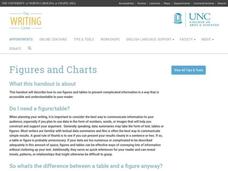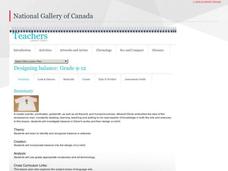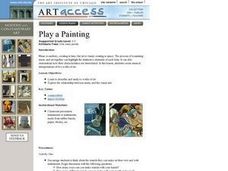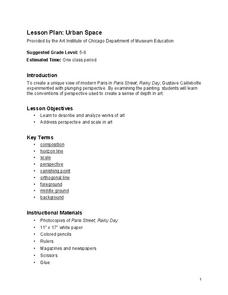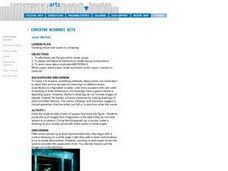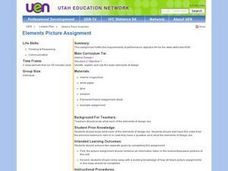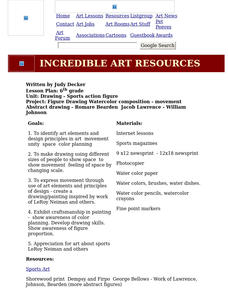Curated OER
Lesson: All in a Name
Lao Tzu was the fabled author of the Toa te Ching, Lau Tzu is also the name of a large sculptural piece. Kids examine Mark di Suvero's larger-than-life sculptures in relation to the elements of art they've learner about. They examine...
Curated OER
Lesson 1- Set Design
Line, shape, color, texture, space. The first in a three-part series of lessons intended for advanced theatre arts classes introduces the elements of set design. Class members examine maquettes and analyze how designers have put together...
Curated OER
Plot Rollercoaster
Visualize a plot rollercoaster using this graphic organizer for budding authors. Don't think you're getting the typical five-part plot structure here, though; there are nine spaces for writers to fill in plot elements, assuring they have...
University of North Carolina
Figures and Charts
Sometimes words aren't the best way to get information across to the reader. The eighth handout in the 24-part Writing the Paper series describes different type of figures and charts to display complex information in a paper....
National Gallery of Canada
Designing Balance
Teach your artists how to incorporate balance into their work through discussion and action. After viewing and discussing several works of art, learners design a balanced image for a T-shirt and follow the step-by-step instructions to...
Curated OER
Politics and Religion in 17th Century Dutch Art
Seventh graders examine different pieces of Dutch Art. They identify its social and political meanings by using cultural and historical information. They examine maps of the time period as well.
Curated OER
Rhythm and Art: Gesture Drawing
Students explore connections between non-verbal language and art. In this visual and auditory art lesson, students investigate the science of sound and principles of drawing. They then use various genres of music to directly apply that...
Curated OER
The Art Box
Sixth graders create a 3-D Art Box in this design-oriented art project for the 6th grade. Rubric is included for grading purposes. The elements of design are covered and applied (includes line, form, texture, shape, value, color, and...
Curated OER
Elements and Principles Using a Movie
Young scholars identify the elements and principles that appear in an illustration of a room and explain each concept in writing. They watch this movie identifying each of the elements and principles of design portrayed in the interiors...
Curated OER
Plaster Sculpture – subtractive method
Practice the subtractive sculpture process with your class. They'll discuss the subtractive method, art form and space, then design a sculpture which they will create from a block of plaster. Technical instructions are included.
Curated OER
Play a Painting
Students examine music and art together and see the distinctive elements of each form. It can also demonstrate how their characteristics are interrelated. They create musical interpretations of two works of art.
Curated OER
Graph Paper Patterns
Young artists divide a piece of graph paper into sections using rectangles, squares, and triangles. They then fill each section with patterns of shape and color. Elementary graders describe how their patterns are organized. Secondary...
Hawaiʻi State Department of Education
Changing Scapes
Culture and art are two things that change with time and context. Learners compare and contrast two landscape prints from different time periods. They work through art terminology to help them describe what they see in each piece. The...
Art Institute of Chicago
Urban Space
The use of perspective is clear in Paris Street; Rainy Day by Gustave Caillebotte. Pupils study and discuss this example, marking the vanishing points and horizon line of a photocopy of the piece. They then create their own urban scene...
Teacherfiles
Character Grid
Characters are built with more than just what the author directly says about a character (ex: she is smart). Help your pupils focus on several elements of characterization with a graphic organizer that has space for two characters....
Curated OER
Creating Mood and Space in a Drawing
Students take photos of spaces that imply the figure. (Students could also pull images from magazines from the web if they do not have access to a camera.) Using the photograph as a source, make a drawing as you usually would with black...
Curated OER
Mass and Space
High schoolers view a variety of sculptures analyzing how space and mass interact, and how sculptors make choices about mass and space to express meaning in their art. They make small three-dimensional sketches experimenting with mass...
Curated OER
Elements Picture Assignment
Young scholars identify the basic structural and decorative designs, create examples of line (horizontal/vertical/curved/diagonal), as well as identify and explain the difference between shape and form. Then, they identify and explain...
Curated OER
Interior Design - Space Unit
High schoolers review the elements of design with a focus on space. During a lecture, they complete a listening guide and ask any questions they might have. Individually, they are given paper to design the classroom in regards to...
Curated OER
I Dig Your Art, Man (or Woman)
Twelfth graders write a thesis regarding a modern artist of their choice for a 15-20 multi-media presentation. In this lesson plan students create a Power Point, video, or some other visual representation studying an artist or modern...
Curated OER
Sports Action Figure
Fourth graders identify art elements and design principles in art such as movement, unity, space and color planning.
Curated OER
Art Careers: Interior Decorator
Students redesign specific areas of their school using interior design techniques, magazine ideas, and cooperative learning groups in this middle and high school level lesson. Emphasis is on examining the career opportunities in interior...
Curated OER
Van Gogh's Starry Night
Students create representations of Van Gogh's "Starry Night" using the main artistic elements of color, line, balance, movement, and space. The class is then asked to discuss the creative process.
Hawaiʻi State Department of Education
Mixed Media Collage
Rhythm, repetition, positive, and negative space is used to create mixed media collages. Let your learners go wild with glue, magazine clippings, and the elements of design. They'll experiment with various types of media, color, and...





